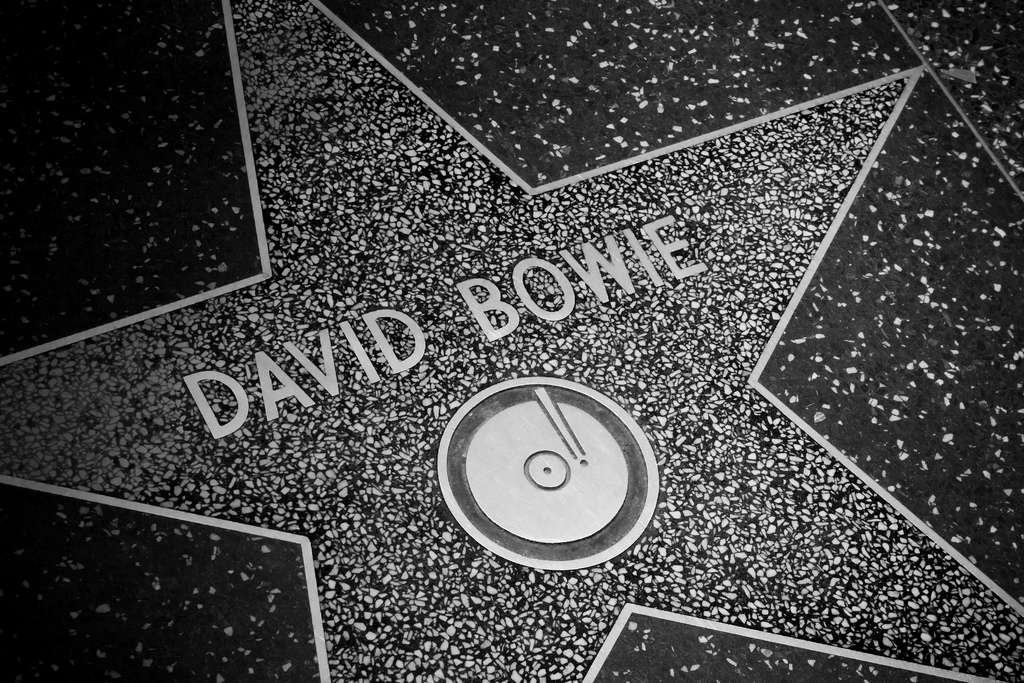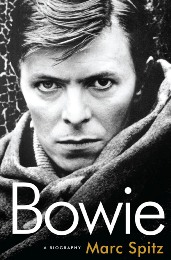
Marc Spitz has been writing on rock and roll and pop since 1997, when he wrote his first piece for Spin. Since then he’s written three books, including We Got the Neutron Bomb : The Untold Story of L.A. Punk, Nobody Likes You: Inside the Turbulent Life, Times, and Music of Green Day
, and a novel, How Soon Is Never?
, about a man trying to reunite The Smiths. His experience with Green Day – who authorized his biography and then recanted – made Spitz decide not to seek his subject’s approval for his latest, Bowie: A Biography
. It’s “not a classical biography,” he says, featuring brief snippets of Spitz’s life alongside the well-detailed Bowie story. “I think more biographies should be in that mode. I don’t know why they’re so chilly.” Below, he explains why Bowie has such a hold on our imaginations, the rise of the “teenage dollar,” and whether any pop artist can claim the Bowie mantle today.
 Q. Why has there been a sudden resurgence of interest in David Bowie?
Q. Why has there been a sudden resurgence of interest in David Bowie?
A. The obvious reason is he hasn’t released a studio album in six years. He also became ill in the middle of a tour that was really well received, and had seemed like the beginning of a new phase. He seemed to be playing rock and roll again and really enjoying himself. I think it was the biggest tour of 2004. And then he has a heart ailment, and everything stopped abruptly. Since then, he has popped up in viral ways. He had that famous cameo on “Extras”, the Ricky Gervais series that got a lot of play on the web. He was on “Spongebob”. He played with the Arcade Fire. And I know they reissued Space Oddity for the 40th anniversary, his “VH1 Storytellers”, and they’re about to reissue Station to Station. They also reissued a really famous bootleg – the Santa Monica Civic Center 1972 concert. There are things going on that are filling the void, and I hope my book will be worthy of that for fans who are hungry to experience Bowie again. There are a lot of new perspectives on his older music. It’s a rebooting of the myth.
Q. What is the Bowie myth?
A. There are two myths. There is the myth of the Bowieist – I don’t know if I coined the term, but I use it a lot. It’s the people who have been moved permanently by him, by what he represents and by his music. They know some of the people around him and are interested in them, like Angie [Bowie], Kenneth Pitt, who was his manager in the 1960s, Mike Garson, who played the piano on all those great records starting with Aladdin Sane. There’s Iggy Pop and Lou Reed and the Warhol people from the 1970s Max’s Kansas City scene. These are the mythic figures of the larger Bowie myth.
And the second myth is for people who just know the broader strokes of Bowie: his being a symbol of bisexual liberated culture, or being a master of reinvention, of shifting characters and being chameleonic. If people don’t know Bowie well, they do know he has changed, because of the way his songs change. They know he embraced certain genres – whether soul in 1975 or the post-MTV, New Wave, feel-good rock of the early ’80s, or electronic, drum-and-bass in the 90s. You don’t need to be a Bowie trainspotter to enjoy this book.
It’s really not even a book about David Bowie. With an artist like Bowie, and very few others – maybe Elvis Presley, maybe Marilyn Monroe, maybe James Dean, maybe JFK or Marlon Brando – you can write a book about culture if you write a book about them. This is a book about the last 50 years of pop culture – that happens to be a Bowie bio- its films, novels, political events that apply, fashion movements that apply, art. It’s a catch-all cultural biography.
Q. Do you remember the first time you heard his work?
 A. I do. I write about this in the book. I can’t remember the exact date. It was Space Oddity, but it wasn’t when it came out. I was born in 1969 so it was around 1976, or slightly later, that I heard it, when it was repackaged on a greatest hits album – Changesonebowie. The first time I heard it was from a neighbor’s friend’s brother, who was playing it on his acoustic guitar. Then I heard it on the album. I became really fascinated by it. I didn’t know what happened to Major Tom, whether he was going to die or float in space forever and ever and ever. That really awakened me at seven or eight or however old I was to, I suppose, existentialism – the notion of just being out there in heaven going around and around. Is that living? Is it death? Heavy ideas for a kid that young to get from a pop song.
A. I do. I write about this in the book. I can’t remember the exact date. It was Space Oddity, but it wasn’t when it came out. I was born in 1969 so it was around 1976, or slightly later, that I heard it, when it was repackaged on a greatest hits album – Changesonebowie. The first time I heard it was from a neighbor’s friend’s brother, who was playing it on his acoustic guitar. Then I heard it on the album. I became really fascinated by it. I didn’t know what happened to Major Tom, whether he was going to die or float in space forever and ever and ever. That really awakened me at seven or eight or however old I was to, I suppose, existentialism – the notion of just being out there in heaven going around and around. Is that living? Is it death? Heavy ideas for a kid that young to get from a pop song.
Then I heard rumors about Bowie’s two mismatched eyes and how he got them, kind of like the rumors about Rod Stewart’s getting his stomach pumped….I was reading Cream which treated rock stars20with a combination of real respect and utter irreverence. They wrote quite a bit about Bowie at the time; he was already very famous and very controversial. I didn’t understand what a lot of that meant at the time, so I was learning a different and more sophisticated sensibility by reading about Bowie, Elton John, Rod Stewart, Led Zeppelin, and KISS of course….
Q. Early in the book you mention that when Bowie was growing up, “pop was everything.” Why, and is it still so today?
A. I can’t imagine that it is as liberating today as it was then. I learned a lot about history writing this book. There are so many things I had no idea about. I just assumed in the 1950s there was nothing, and then there was Elvis, and it was like the Big Bang. I didn’t understand the relationship to World War II and the introduction of credit and the sudden power of the teenage dollar. I’m sure the teenage dollar is just the same and just as powerful now as it was then, but it was the first time it was ever powerful. It was a real shift. When teens first claimed that, it had to have scared the shit out of their parents.
Second, there’s no revolution anymore. It was a real thing then, even if you watch those cheesy movies I write about, like “The Girl Can’t Help It”. Those kids are really cutting loose and rebelling in a genuine way. Bowie was one of those early rebels. He was the immediate post-James Dean or post-Jack Kerouac rebel. He violated the dress code. I don’t even know if there are dress codes anymore. The post-James Dean archetype was a direct reaction by the kids who came of age in England when it was still ripped up by Nazi bombs. Their parents were walking around literally shell-shocked from World War II, and the kids were thinking, who is to say this isn’t going to happen again? Particularly once the Cold War began, and they had to learn to duck and cover because of mutually assured destruction, because of ICBMs aimed at every major city. It could happen any moment: one minute you’re here and the next minute there’s a mushroom cloud. Why wouldn’t you embrace Little Richard, and everything full of life and sexy, everything that makes your parents worry and that speaks to you directly? Little Richard spoke to David Bowie when he was David Jones.
I don’t know if it’s the same today. I’m 40. I wouldn’t presume to talk about what it’s like to be 15. I wouldn’t want to be 15 today, though. How are they going to rebel in an age when there is really no mystery to anything? You can know anything you want to know about Kanye West or Lady Gaga in ten seconds and so can your mom and dad.
Q. David Bowie seemed to be uniquely able to capture the spirit of his time – even over decades. Is there anyone like him today?
A. The natural follow-up to Bowie was Madonna. She was one step ahead and got a lot of grief from people who said she co-opted one thing or the other. She had seen the Vogue-ers from Paris is Burning, and she brought it to the mainstream in the same way that Bowie took the gay sensibility of Sombrero’s, a nightclub in London, or the Max’s Kansas City cattiness, and injected it into his Ziggy persona in the early 70s, really beginning with Hunky Dory on a song like “Queen Bitch.” Later he used Harlem style – going uptown and copying the way the Puerto Rican street characters dressed, taking it mainstream on the Diamond Dogs tour and the Young Americans album. Madonna does the same thing. She mainstreams the fringe in a really smart way, or has. I don’t know if either of them do it anymore.
The person I saw do this most recently is Kanye West, when he did that song with Daft Punk. That was a very Bowie move. [West] has had a bad rep recently, but he could be our Bowie, if he doesn’t lose his marbles. It’s a smart, cannily approached commodification of below-the-radar pop elements. West has been around for almost 10 years, though. I don’t know if there is anyone more recent. Some people just completely bite Bowie, like the guy in Of Montreal. Some people are super fans like Brandon Flowers of the Killers. I don’t know that anyone is operating at the level of a Bowie or a Madonna besides Kanye.
Q. Would you put Lady Gaga in that category?
A. She’s so new, she’s the phenomenon of this year. The jury may be out a little bit longer, but there is definitely potential. You have to watch and see what she does next. She’s smart, and kind of fearless. Bowie, from what I know, is a weird combination of utterly fearless, audacious, bold and demanding of attention, and almost pathologically shy. He’s a paradox, which makes him a good subject for a book…. If Lady Gaga can be that slippery and that unpredictable and that smart, as Madonna was and as Kanye seems to be, then she’d be really valuable and really compelling. Then someone – not me – will write a book about her someday.
*Photo of David Bowie’s star courtesy DRust.




Send A Letter To the Editors